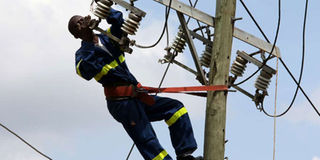World Bank raises red flag over Kenya’s high power bills

A Kenya Power employee at work. PHOTO | NATION MEDIA GROUP
What you need to know:
- Access to electricity is inextricably linked to its affordability for citizens to enjoy the fruits of universal electrification, report shows.
- Last week, Energy Regulatory Commission director-general Pavel Oimeke said electricity charges will be harmonised from July.
High costs of electricity could derail efforts geared towards achieving universal electrification, a report by the World Bank shows.
The latest World Bank energy report has listed Kenya among developing countries that are more rapid on expanding electrification to their citizens globally alongside Bangladesh, Ethiopia and Tanzania at more than five per cent annually between 2014 and 2016.
SDG
However, it has emerged that access to electricity is inextricably linked to its affordability for citizens to enjoy the fruits of universal electrification, which is listed as the Sustainable Development Goal 7 (SDG7) among the 17 set by the United Nations.
“Affordability is potentially an issue not only for countries working toward universal access but also for countries that have already achieved it,” states the report.
The study titled ‘Tracking SDG7: The Energy Progress Report 2018’ was carried out in conjunction with the UN, World Health Organization, International Energy Agency and International Renewable Energy Agency.
It adds: “Estimates suggest that, even in countries with universal access, affordability concerns affect about 30% of the population. In countries working toward universal access, affordability affects 57% of those who already have access.”
In Kenya, the Last-Mile Project which is a Kenya Vision 2030 flagship project was launched in 2015 aiming at providing universal access to electricity by the year 2020.
This is through subsidies funded by the Africa Development Bank and the Government of Kenya that make it easier for rural communities, majority of them poor, to get connected to the national grid.
During a State of the Nation address at the National Assembly last week, President Uhuru Kenyatta said the project has so far increased the number of households with access to electricity from 27 per cent in 2013 to the current 71 per cent.
“I am particularly proud of this success, for I know its transformative power. I have seen for myself that on the day a family first switches on a bulb, their entire lives change,” he said.
However, complaints are rife from power consumers in the country regarding exorbitantly high charges by the national electricity distributor, Kenya Power, which raises concern as to whether the transformation brought about by this project will be sustainable in the long term.
Last week, Energy Regulatory Commission director-general Pavel Oimeke said electricity charges will be harmonised from July.
This was after a directive from Energy Cabinet Secretary Charles Keter who wanted the commission to change the system whereby charges vary every time a consumer pays for electricity.





